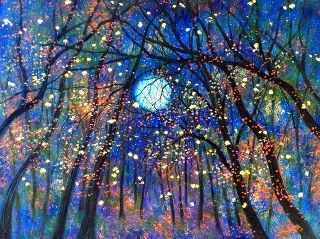With you as my therapist I finally learned to trust another human being. You helped me discover faith in the world and in myself. I didn’t think that was going to be possible. You have been a real gift in my life.

What’s In A Name? A “Dream by Any Other Name…”
“Sweet dreams are made of these…”
Welcome to the dog days of summer,
Summer time- this one’s just for fun. I started thinking about how many different ways we use the word “dream” in our language. This little word can have so many different meanings—so versatile! It seems that we are fascinated with this whole concept of “dream states”, and use the concept for a variety of feelings and ideas. The most common meaning for the word “dream” is of course the kind we have at night, but the word is used to refer to so many things I thought it might be fun just to look at them. I invite you to add to the list.
The origin of the word “dream” in the English language is from the Middle English “dreem” (1050) and originally meant joy, mirth, and gladness. In Hebrew the word for dream is “chalom” (rhymes with shalom), and it means both dream and vision depending on how it is used, and the context of the usage. The bible has translated the same word differently according to who was speaking. Joseph and Solomon were said to have “dreams”, while Elijah and Moses were said to have “visions”. Martin Luther King had a dream “…I have a dream that one day this nation will rise up and live out the true meaning of it’s creed…that all men are created equal.” This was his vision for the future; we can hope that he was prophetic in this.
So, we have night dreams, we have visionary dreams, and we have “day dreams”. We have day-dreams while we are awake, and our mind is taking a little trip on it’s own away from wherever we actually are. Daydreaming has been used to refer to simply looking out the window and “spacing out”, and also to “wool gathering” or musing on our own more interesting thoughts or fantasies instead of paying attention to whatever is happening in the room right now.
Then there is the concept of dreams as “wishful thinking”- as in, “I’ve been dreaming of going to Greece for over 20 years.” Related, but slightly different, is dream as what you aspire to; a strongly desired goal or cherished ambition as in “I’ve always dreamed of touring with a rock band” as you practice your guitar riffs. Realizing these ambitions and satisfying a wish are also referred to as a “dream come true”. And what is “the American dream” anyway? Westward expansion? a house in the suburbs?, making it big? What is your dream–do you have a dream garden, or a dream vacation, or a dream date?
My daughter was given an assignment in her English class to write about what is meant by the idea of “dreams deferred” while studying the book “A Raison in the Sun”. Mama’s dream in the book is to have a nice house with a garden; Walter wants to be the man of the house, and Bethena dreams of becoming a doctor- something which a black southern girl of that era could “only dream of”.
On the other side of the spectrum, the word dream is also used to refer to bunk, garbage, a waste of time, as in “Stop dreaming- that will never happen”, “It’s just a pipe dream” or “Stop dreaming and do your homework.” In this category may also be the concept of being unrealistic, or suffering delusions “You’re just dreaming- snap out of it”. It is interesting to me that the same word is used to refer to very opposite concepts and ideas- why do you think this is so? If some one is “living in a dream world” is that a positive or negative thing? “Dreams” and “hallucinations” are sometimes used interchangeably.
Then we have perfection, or “It’s too good to be true” (as in “This is my dream job)”, a beautiful love object (“He‘s so dreamy”) and something that works very well and smoothly (as in “It runs like a dream). When we imagine something that may be beyond our present reach, we are said to be dreaming about it (“You’re just dreaming”). On the contrary, when there is something we would never do, we say “I wouldn’t dream of it.” “Dreamy images” are usually vague or blurry.
And just think of the songs with dream in their title, or part of the words!: “Daydream Believer” (The Monkeys), “…Whenever I want you all I have to do, is dream a little dream-of you…” (Everly Brothers), “Last night I had the strangest dream, I ever had before, I dreamed the world had all agreed to put an end to war…” (I think maybe by Arlo Guthrie), “California Dreaming” (The Mamas and the Papas) “Oh What a Day for a Daydream” (The Lovin Spoonful), “Day Dreaming “ (Aretha Franklin), “Dream Lover” (Bobby Darin), “Dream On” (Aerosmith), “In Your Wildest Dreams” (Tina Turner w/ Barry White), “Never Dreamed You’d Leave in Summer” (Stevie Wonder), ‘Sweet Dreams (Are Made of This)” (Eurythmics), “Sweet Dreams’ (Beyonce), “Teenage Dream” (Katy Perry), “Dreamlover” (Mariah Carey), “Dreams” (van Halen) and so on and on and on…
I bet you can you add to the list.
And sometimes we are able to succeed “beyond our wildest dreams”.
Sweet dreams,
Linda Yael
Go deep into yourself, and see how deep the place is from which your life flows.
-- Rilke